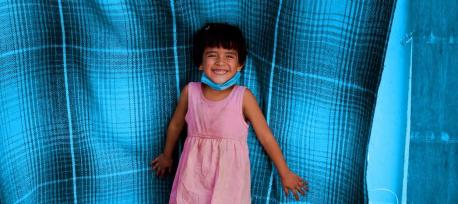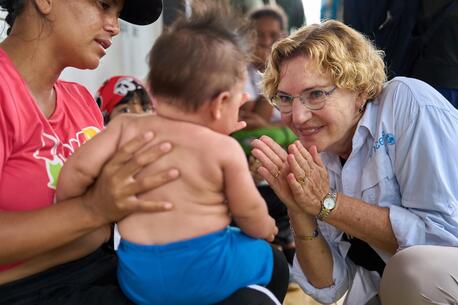
What UNICEF Does
Over eight decades, the United Nations Children’s Fund (UNICEF) has helped save and meaningfully improve more children’s lives than any other humanitarian organization.
Everything UNICEF does — all of its programs and partnerships and global advocacy work — is in pursuit of one goal: to ensure that every child can grow up healthy, educated, protected and respected.
Immunizing children against vaccine-preventable diseases. Tackling malnutrition. Supporting mental health. Helping kids get back to school. Strengthening systems that keep them safe from harm.
Respecting children's rights — and making sure youth voices are heard on issues that matter to them.
UNICEF works in some of the world's toughest places to protect the rights and meaningfully improve the lives of children and young people with the greatest needs.
And UNICEF leans into local partnerships — supporting and collaborating closely with local and community-based organizations. This helps maximize program reach, efficiency and effectiveness, while also strengthening local capacities to deliver for children.
UNICEF workers won't stop until every child can grow up hopeful about their prospects for a bright future.
UNICEF's impact for children
More children than ever are suffering in today's world, their lives disrupted and endangered by conflict, political instability and disease, and by historic floods, droughts and other impacts of climate change.
Through it all, UNICEF continues to provide the services and support children need to withstand devastating events — and help families, communities and countries build resilience against future crises.
Children's health
UNICEF works is many different ways to improve and protect the health of children worldwide: by working with partners to strengthen quality and delivery of essential health care services; by improving access to safe water, sanitation and hygiene and improving WASH systems; through lifesaving immunizations, nutrition and mental health support, among other programs.
Learn more about UNICEF's impact on children's health.
Children's education
Whether by setting up temporary classrooms for child refugees, building child-friendly schools, distributing books and other learning materials, training teachers or even rebuilding an entire educational system, UNICEF does whatever it takes to improve children's access to education.
Learn more about UNICEF's impact on children's education.
Children's protection
Growing up in a safe, inclusive environment is every child's right. Through its work with partners and collaborations with national governments, UNICEF promotes policies and services that protect all children from violence, exploitation and abuse — especially those who are most vulnerable, including children in conflict and children on the move; children with disabilities and children who become separated from caregivers.
Learn more about how UNICEF is protecting vulnerable children.
Respect for children
Guided by the Convention on the Rights of the Child, UNICEF works to promote and safeguard children's basic human rights — rights that must be realized for children to reach their full potential. The right to health care, education and protection. The right to equitable opportunity, regardless of ability. The right to grow up in a clean, safe environment. The right to be heard.
Respect for children underpins everything UNICEF does. Learn more.
Emergency response
UNICEF is on the ground before, during and after emergencies strike to bring immediate relief to children and families with the greatest needs. With program offices in 157 countries, 7 regional offices and global headquarters in eight cities, UNICEF taps into existing partnerships and systems to mobilize a rapid and efficient response. While helping to repair damaged infrastructure and otherwise support recovery, UNICEF also helps communities 'build back better.'
Where UNICEF works
UNICEF has a global presence in over 190 countries and territories — including the United States. UNICEF USA is one of 33 National Committees created to support UNICEF's mission, working relentlessly to pursue a more equitable world for children.
The vast majority of UNICEF staff are in the field, working with governments and other partners to implement lifesaving and life-changing and life-sustaining programs for children in Africa, Asia, Europe, the Middle East, North America and South America.
Learn more about what UNICEF does in different regions of the world. Or visit the UNICEF data hub for details on UNICEF program activities and impact by country.
How to help vulnerable children: Donate monthly to UNICEF
Monthly giving is an opportunity to be proactive as well as compassionate. It helps UNICEF maintain critical support and services that blunt the impacts of poverty, hardship and deprivation, build community resilience and drive sustainable progress against ongoing threats to children’s health, safety and well-being.



